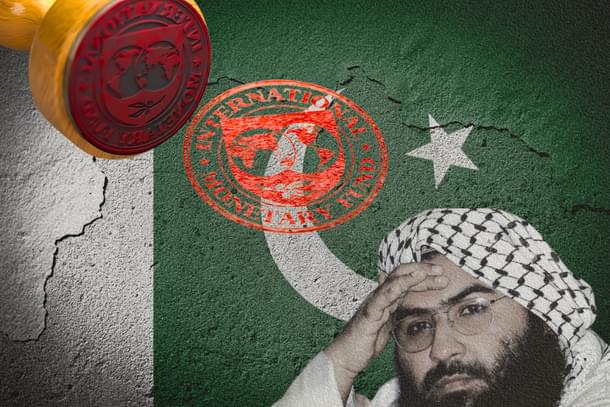World
Bombs At Dawn, Bailouts By Noon: How IMF Cash And Western Hypocrisy Keep Pakistan’s Terror Machine Humming
Sujeet Kumar and Rajwardhan Rana
May 26, 2025, 01:32 PM | Updated May 27, 2025, 12:12 PM IST
Save & read from anywhere!
Bookmark stories for easy access on any device or the Swarajya app.


If irony could be monetized, Pakistan’s generals might never need another IMF cheque. Consider the scene earlier this May: Indian fighter jets roar over Bahawalpur and Muridke, turning Lashkar-e-Taiba and Jaish-e-Mohammed real estate into smoking craters during Operation Sindoor.
Barely had the dust settled when the International Monetary Fund wired Islamabad a brand-new loan: one billion dollars for “reforms” plus a climate-friendly sweetener of $1.4 billion. The timing was exquisite. Missiles still in the air, coffins still open, and voilà — terror’s favourite state received a cash infusion endorsed by the very capitals that denounce “cross-border violence” at every press conference. One could almost admire the choreography: bombs for breakfast, bailouts by brunch.
One does not require a PhD in strategic studies to see the choreography. Washington, holding the IMF’s single largest vote share, could have blocked the package with a flick of the veto pen. Publicly, the White House scolded Pakistan for its “continued tolerance of extremist safe havens.” Privately, it hustled the loan through, then took a victory lap for brokering a ceasefire.
The logic is familiar: first bankroll the arsonist, then sell the fire extinguisher and collect Nobel peace points for handing it over. Pakistan’s uniformed elite learned long ago that the quickest route to international charity is to park a matchbox beside a powder keg, then smile innocently when the fumes waft across the border. New Delhi’s protest landed with a diplomatic thud; moral outrage, alas, has no voting shares in Washington.
Consider the business model. Over four decades, the Inter-Services Intelligence has groomed a menagerie of proxies — Lashkar-e-Taiba, Jaish-e-Mohammed, Harkat-ul-Mujahidin — whose sole task is to bleed India while granting Islamabad plausible deniability. Their payrolls are padded through hawala pipelines snaking in from the Gulf, zakat boxes outside Karachi mosques, narcotics caravans along the Durand Line and, when times are tight, by line items buried deep inside the federal budget.
Lashkar’s charity façade, Jamaat-ud-Dawa, sets up Ramadan donation stalls right under police floodlights; Jaish’s Bahawalpur complex, marketed as an academic seminary, doubles as a conveyor belt for suicide bombers. When global watchdogs mutter about terror financing, Islamabad shuts a gate or two, schedules a press conference and waits for the news cycle to turn. Why worry about FATF grey lists when the IMF itself stands ready to plug any budget hole?
Still, Western diplomats are shocked whenever India points out this carnival of duplicity. “Pakistan is a frontline ally in counter-terrorism,” they insist, studiously ignoring that the front line often starts at an ISI safe house. One recalls that over $33 billion in U.S. aid since 9/11 produced precisely two deliverables: Osama bin Laden’s bungalow in Abbottabad and annual Washington self-flagellation sessions in Congress titled “Where Did Our Money Go?” The answer, of course, is Bahawalpur, Muridke, and assorted jihadi pension schemes.
The IMF cheque was justified as a humane effort to stave off Pakistan’s economic collapse. Collapse, however, is cosmic shorthand for “the Army might have to cut its golf-course allowance.” Long-suffering Pakistani civilians see little of these bailouts; inflation gobbles their paycheques while defence allocations keep climbing like a jihadi at a madrasa rope course.
Within hours of the IMF vote, Islamabad’s ministers pledged to rebuild Lashkar’s shattered “orphanage” in Muridke — apparently those orphans run firing ranges — and to pay Masood Azhar’s family about ₹14 crore in “compensation.” Taxpayers in New York, London, and Tokyo should be delighted: their goodwill dollars just became blood money, laundered through Islamabad’s budget with the IMF logo as detergent.
Western geopolitical experts argue that maintaining Pakistan’s solvency is indispensable: unsecured nuclear weapons, blocked Afghan supply routes, or an irate Islamabad refusing overflight rights when Washington eventually focuses on Tehran are risks the West would rather pre-empt. In that ledger, a billion here, a billion there — who’s counting? Certainly not the Counter-Terrorism Bureau.
Meanwhile, China chuckles from the wings. Beijing has already poured tens of billions into the China-Pakistan Economic Corridor, which incidentally runs past several jihadist dens the PLA would prefer not to publicize. Each IMF rescue spares Beijing the awkward choice between writing another bailout itself or watching its shiny Belt-and-Road ports repossessed. Small wonder China spent years vetoing UN terror listings on Masood Azhar: strategic assets deserve strategic impunity.
To be sure, the Fund now trumpets “eleven new structural benchmarks” Pakistan must meet, ranging from new tax measures to power-tariff hikes. These clauses appeared only after India’s Defence Minister loudly warned that IMF money would bankroll terror. One can almost hear the IMF’s clerks muttering: better slap on conditions before New Delhi shames us again.
Besides, the IMF’s devotion to “rules” bends when Western interests beckon. Last year, the Board quietly rewrote its own war-time restriction to funnel cash to Ukraine; earlier it rushed standby deals for friendly regimes in Argentina and Egypt while lecturing out-of-favour governments on discipline.
Western hypocrisy does not end with money. Listen to the sermonising after every new outrage in Kashmir: “Violence is never the answer,” intone European chancelleries that promptly resume arms sales to Islamabad. “All parties must exercise restraint,” tweets follow — as though Lashkar and the Indian Army occupy identical moral planes.
The equivalence game is lucrative; it keeps the aid channels open and the diplomatic revolving doors spinning. When India presents satellite imagery of terror camps, the usual chorus pipes up: “Both sides must share evidence.” Translation: please dilute your outrage so we can maintain our cherished balance-of-payments neutrality.
India must also illuminate all this hypocrisy. When the Pakistani Defence Minister confesses on international television that they have farmed out terrorism “because the West wanted it,” those words should loop in donor capitals until taxpayers demand accountability.
Yet Indians are asked to applaud the charade because the IMF attached “strict conditionalities” to its loan. Those familiar with Pakistan’s 24 previous IMF programmes might recall the drill: Islamabad promises tax reforms, shrugs, blames political instability, requests waivers, collects the next tranche, and returns in three years for a sequel.
Conditionality resembles a New Year’s gym membership: enthusiastically purchased, rarely used. Meanwhile, militants enjoy continuity funding. When global watchdog FATF briefly grey-listed Pakistan between 2018 and 2022, Islamabad staged a few theatrical arrests — Hafiz Saeed was sentenced on token charges just ahead of an FATF plenary, then kept in a “high-security” residence whose gates revolved faster than a Lahore food-street vendor. Once FATF blinked, the crackdown melted like Karachi ice cream in July.
Of course, none of this would matter if Pakistani proxies confined themselves to their own borders. They do not. Mumbai learned that in 2008; Pathankot and Pulwama learned later. Each bombing is financed by the same ecosystem international lenders appear determined to keep afloat.
The hawala conduits from Gulf donors, the zakat kitty boxes outside Rawalpindi mosques, the ISI stipends — these revenue streams feed recruitment, training, travel, explosives. And every billion-dollar bailout that shores up Pakistan’s foreign reserves effectively releases an equivalent sum for Pakistan’s generals to underwrite this machinery. Money, after all, is fungible — the single most inconvenient truth global financiers pretend not to understand.
India, for its part, has graduated from dossiers to drones. Operation Sindoor showcased the precision reach of Indian air power: pinpoint strikes, minimal collateral, zero appetite for annexation — just the surgical removal of terror tumors Islamabad refused to excise.
Yet even as New Delhi demonstrates military restraint seasoned with resolve, the international purse guarantees the patient another lease of malign life. Why reform if the world bails you out whenever your misadventures drain the exchequer? Pakistan has learned the smartest investment strategy imaginable: keep a proxy war simmering, cry bankruptcy, then monetize your nuisance value.
What is the remedy? First, call the bluff. Western chancelleries must decide whether “rules-based order” is a press-release ornament or a governing principle. If it is the latter, then financing a state whose army publicly funds UN-listed terrorists cannot continue. Congresses and parliaments in donor nations should attach explicit terror-non-diversion clauses to every package, backed by automatic snap-back sanctions.
Second, the IMF must treat serial delinquency as disqualifying, not routine. Twenty-four programmes in 65 years is not stabilization; it is addiction. Impose a moratorium until verifiable audits show no rupee — or dollar — touches any entity sanctioned by the UN, India, or FATF.
Third, India should mobilize its growing heft — economic, diplomatic, and cultural — to make any future bailout politically toxic. Publish satellite proof of rebuilt camps, and circulate dossiers in every capital.
Finally, New Delhi must double down on self-reliant deterrence. The message of Operation Sindoor was clear: if the world will not bankrupt Pakistan for atrocity, India will degrade the terror infrastructure directly. Each Indian strike also exposes the absurdity of the “broker-mediator” model beloved in the West.
It reminds the West that strategic indulgence has reach limits: when your client’s proxies kill Indian civilians, don’t be shocked when the other side answers on the battlefield. And if that response coincides with an IMF signing ceremony, well, history will note who bombed terrorist camps and who bankrolled their resurrection.
The West likes to say it stands at the moral vanguard. Very well. Let it start by ceasing to bankroll a country that treats terrorism as foreign policy. Until then, every lecture on human rights, every handshake photo-op, every lofty communique about “shared democratic values” rings hollow from Srinagar to Mumbai.
India no longer needs lessons in restraint; we need partners who refuse to subsidize the bullets aimed at our citizens. If Washington’s cheque-writers and IMF technocrats cannot grasp that, perhaps they should at least spare us the sermons.
In the meantime, let Pakistan’s generals study the new arithmetic: subsidies buy them time, but Indian resolve subtracts terrorist assets faster than any bailout can replenish them. A few more cycles of bombs followed by bailouts, and even the most patient taxpayers in distant capitals may ask the obvious: why are we underwriting failure armed with Kalashnikovs?
Until that epiphany dawns, expect more hollow condemnations, more creative loan instruments, and yes — more Operations Sindoor. Because when the custodians of the rules look the other way, those who bleed must write their own.
Sujeet Kumar is a Member of Parliament in the Rajya Sabha from the state of Odisha and a practicing Advocate. Opinion is personal and does not represent the views of his political party or any other organization he is associated with. Rajwardhan Rana is a Mukherjee Fellow working with Mr. Sujeet Kumar, a Member of Parliament in Rajya Sabha from the state of Odisha.




